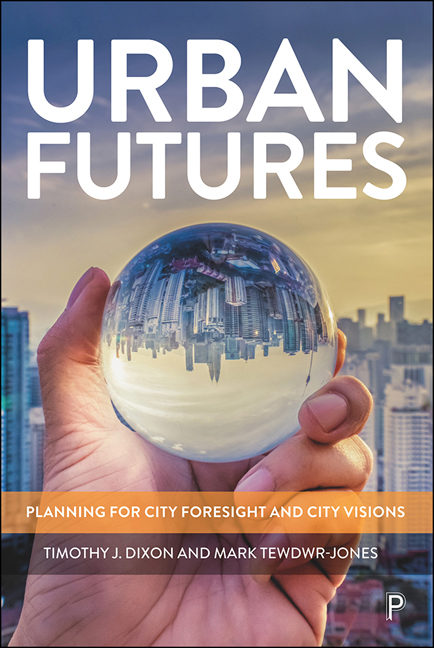Book contents
- Frontmatter
- Contents
- List of figures, tables and boxes
- Acknowledgements
- Foreword
- Preface
- 1 Urban futures: planning for city foresight and city visions
- 2 Cities and integrated urban challenges
- 3 Reimagining the city: views of the future from the past and present
- 4 Planning and governing the future city
- 5 Future narratives for the city: smart and sustainable?
- 6 Theoretical approaches to urban futures
- 7 Using city foresight methods to develop city visions
- 8 Shaping the future: city vision case studies
- 9 The innovative and experimental city
- 10 Visioning and planning the city in an urban age: a reality check
- 11 Conclusions: facing the urban future to 2050 and beyond
- Appendix: selected examples of city visions
- Notes
- References
- Index
10 - Visioning and planning the city in an urban age: a reality check
Published online by Cambridge University Press: 21 December 2021
- Frontmatter
- Contents
- List of figures, tables and boxes
- Acknowledgements
- Foreword
- Preface
- 1 Urban futures: planning for city foresight and city visions
- 2 Cities and integrated urban challenges
- 3 Reimagining the city: views of the future from the past and present
- 4 Planning and governing the future city
- 5 Future narratives for the city: smart and sustainable?
- 6 Theoretical approaches to urban futures
- 7 Using city foresight methods to develop city visions
- 8 Shaping the future: city vision case studies
- 9 The innovative and experimental city
- 10 Visioning and planning the city in an urban age: a reality check
- 11 Conclusions: facing the urban future to 2050 and beyond
- Appendix: selected examples of city visions
- Notes
- References
- Index
Summary
For I dipped into the future, far as human eye could see, Saw the Vision of the world, and all the wonder that would be.
Alfred Lord Tennyson, 1809–92, Locksley HallIntroduction
In this chapter, we delve further into the idea of visioning and planning in cities. The urban has always been seen as a complex system of systems, a thriving and living organism, which constantly moves and heaves. In more modern parlance, it may also be seen as a machine of inter-related parts, each element of which works in tandem with others. Cities have developed over millennia and scholars have been continuously fascinated with this urban movement, as layers of change and development have transformed both the landscape and life within the urban arena. Cities today comprise a palimpsest, layer upon layer of history and intervention, of progress and growth, and of struggle and conflict.
Solutions to the challenges that cities face today might seem out of reach, but in reality societies and governments have always been faced with the need to respond. Having some sense of future direction, or trajectory of travel, is a significant task for any area faced with more immediate concerns. Visions are useful and valuable for their ability to contribute to democratic debate about appropriate directions forward; visions may have been much more directorial in past times than is called for today, but they do allow us to make sense of where we are and where we would like to be, even if the route to that destination is uncertain. As both city governments and urban planning powers have diminished, at least in the global north, and branded as unfashionable for the 21st century, questions remain about the usefulness of city visioning for planning, in a context where a multitude of organisations, sometimes in harmony but often fragmented, shape and reshape the city.
This will chapter examine the changing shape of cities, their complexity and transformational changes. It will set out the case for the development of city visions and for urban planning to be seen and utilised as a stock of knowledge and methods that can assist cities in both assessing and managing present-day challenges and carving out paths for the future.
- Type
- Chapter
- Information
- Urban FuturesPlanning for City Foresight and City Visions, pp. 201 - 216Publisher: Bristol University PressPrint publication year: 2021



